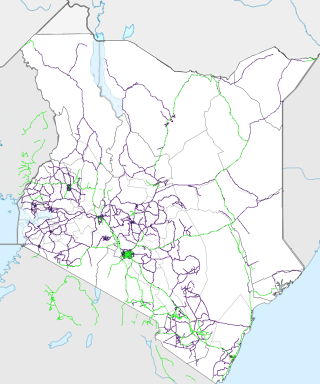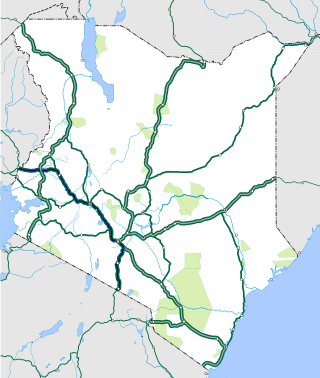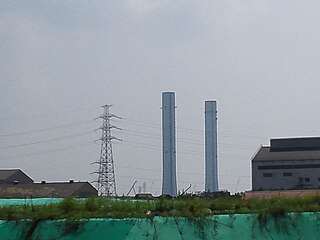
Transport in Kenya refers to the transportation structure in Kenya. The country has an extensive network of paved and unpaved roads.

Liquefied natural gas (LNG) is natural gas (predominantly methane, CH4, with some mixture of ethane, C2H6) that has been cooled down to liquid form for ease and safety of non-pressurized storage or transport. It takes up about 1/600th the volume of natural gas in the gaseous state at standard conditions for temperature and pressure.

Kilindini Harbour is a large, natural deep-water inlet extending inland from Mombasa, Kenya. It is 25–30 fathoms (46–55 m) at its deepest center, although the controlling depth is the outer channel in the port approaches with a dredged depth of 17.5 m (57 ft). It serves as the harbour for Mombasa, with a hinterland extending to Uganda. Kilindini Harbour is the main part of the Port of Mombasa, the only international seaport in Kenya and the biggest port in east Africa. It is managed by the Kenya Ports Authority (KPA). Apart from cargo handling, Mombasa is frequented by cruise ships.

Burning of renewable resources provides approximately 90 percent of the energy in Uganda, though the government is attempting to become energy self-sufficient. While much of the hydroelectric potential of the country is untapped, the government decision to expedite the creation of domestic petroleum capacity coupled with the discovery of large petroleum reserves holds the promise of a significant change in Uganda's status as an energy-importing country.
Natural gas was Canada's third largest source of energy production in 2018, representing 22.3% of all energy produced from fuels in the country. By contrast, the share of fuel-based energy production from natural gas in 2013 was 17.0%, indicating a growth rate of approximately 1.06% per year.

Mombasa Road, also known as the Nairobi–Mombasa Road, or Mombasa–Nairobi Road or A109 Road (Kenya) is the main road between Nairobi, Kenya's capital and largest city and Mombasa, the country's largest port city. The road is a component of the Northern Corridor. It is part of the Lagos–Mombasa Highway.
Dongo Kundu Bypass Highway, also Mombasa Southern Bypass Highway , is a road under construction in Kenya. When completed, it will connect Mombasa Mainland West to Mombasa Mainland South, without entering Mombasa Island.

Lake Turkana Wind Power Project (LTWP) is a wind farm in Kenya. It is located in Loiyangalani District, in Marsabit County, approximately 545 kilometres (339 mi) by road north of Nairobi, Kenya's capital city. The wind farm covers 160 square kilometres and has a capacity of 310 MW, enough to supply one million homes. It comprises 365 wind turbines, each with a capacity of 850 kilowatts. The associated overhead electric grid distribution system and a high voltage substation that connect it to the national grid.
The proposed Lamu Coal Power Station is a potential 1,050 MW (1,410,000 hp) coal-fired thermal power station in Kenya. The proposed plant would be developed on 865 acres of land and feature a 210 meter tall smoke stack, which would become East Africa's tallest structure. It would have been the first ever coal power plant in Kenya.
Amu Power Company is a power generation company based in Nairobi, Kenya.
Rabai Thermal Power Station is a 90 megawatt heavy fuel oil-fired thermal power station in Kilifi County, Kenya.
The Tanzania Liquefied Natural Gas Project (TLNGP), also Likong’o-Mchinga Liquefied Natural Gas Project (LMLNGP), is a planned liquefied natural gas processing plant in Tanzania.

The Nairobi–Malaba Road, also Nairobi–Uganda Road or A104 Road (Kenya) is a major highway in Kenya, the largest economy in the East African Community. The road connects Nairobi, the capital and largest city in Kenya, with the border town of Malaba at the international border with Uganda.
Tanzania Mbolea and Petrochemical Company (TMPC), a Tanzanian company that was specifically formed to design, build and operate a fertilizer-manufacturing factory in the Mtwara Region of Tanzania, using natural gas as raw material.

The Olkaria V Geothermal Power Station, also known as the Olkaria V Geothermal Power Plant is a power station in Kenya, with an electric capacity of 158 megawatts (212,000 hp).
Suswa–Isinya–Rabai High Voltage Power Line is an operational high voltage electricity power line connecting the high voltage substation at Suswa, Kenya to another high voltage substation at Rabai, Kenya.

Chiba Thermal Power Station, is an operational thermal power station located in Japan, run by JERA, with a maximum output of 4380 MW. Originally built in the late 1950s as a coal-burning plant, it was later converted to a plant burning liquefied natural gas in the year 2000.









